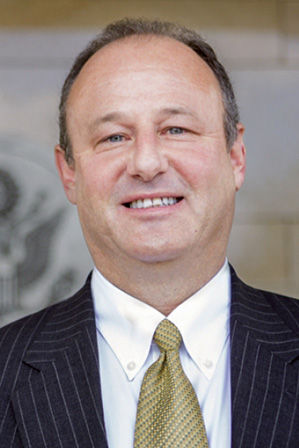Can’t Anybody Here Play This Game?
President’s Views
BY ERIC RUBIN

“Can’t anybody here play this game?” With a nod to the late, great baseball manager Casey Stengel, who asked this question about the 1962 New York Mets, it is getting harder to avoid asking the same question about our country’s senior diplomatic staffing.
As I write in early October, we face a situation with more than 40 U.S. ambassadorships unfilled nearly two years into the Biden administration. More than half are pending confirmation in the Senate, some having been stuck for well more than a year. The other half are positions for which no one has yet been nominated by the president.
No other country that I know of fails to fill its key diplomatic positions to this extent. In some cases, we have had ambassadorial positions vacant for as long as five years. It should go without saying that we are facing a dangerous, complicated set of challenges in an unstable world and need to field the strongest possible team.
In Brazil, where we have no ambassador, critical elections are being held and the incumbent has threatened not to recognize the results. In Italy, where we have no ambassador, a government led by the far-right wing is taking power, with key parts of its coalition hostile to NATO and European Union support for Ukraine and sanctions on Russia.
In India, where we have no ambassador, we are struggling to gain New Delhi’s support for pressure on Russia to end its aggression in Ukraine and working to develop greater ties to the second-most populous country on earth (on track to become the most populous soon).
In Colombia, where we have no ambassador, the fragile gains of the now-shaky peace process are threatened by narcotraffickers. In Haiti, where we have no ambassador, national collapse and meltdown seem all too possible. In Ethiopia, which has descended into civil war and mass human suffering, we have no ambassador.
These are just a few of the countries with no U.S. ambassador in place; and there is not even a nominee for any of those posts except Brazil and India (where the two nominees involved have faced long delays in getting a floor vote).
The list of posts with nominees awaiting action and confirmation by the Senate is long and includes critical countries such as Saudi Arabia and Russia.
AFSA’s ambassador tracker illustrates the state of affairs and is updated daily: www.afsa.org/ambassadorlist.
We do have superb, talented, and dedicated chargés d’affaires in every country without a U.S. ambassador. A few are experienced senior diplomats with previous ambassadorial experience who have been sent to run our missions in the interim. But in most cases, the chargés are career officer deputy chiefs of mission (DCMs) who are effectively doing two jobs at once. This amounts to tying one hand behind our back in the diplomatic arena.
Foreign countries value the presence of a U.S. ambassador who has been nominated by the president and confirmed by the Senate, thus carrying the authority and endorsement of both branches of government. U.S. ambassadors get high-level access in foreign capitals as well as in Washington; chargés frequently do not.
U.S. multiagency teams at our missions abroad look to the ambassador to coordinate policy, advance priority objectives with the host government and Washington, and mediate interagency disputes and conflicts. Chargés have the authority of the State Department behind them, but that is by no means equivalent.
Further, our career colleagues overseas need the guidance and support of a confirmed ambassador, whether career or political, along with the mentoring and training that can best be provided by senior confirmed chiefs of mission.
I am reminded of a quote from another late, great baseball icon, Yogi Berra: “If you don’t know where you are going, you’ll wind up somewhere else.”
Do we know where we are going diplomatically in today’s world? It is high time to get serious about fielding a full team overseas.
When sharing or linking to FSJ articles online, which we welcome and encourage, please be sure to cite the magazine (The Foreign Service Journal) and the month and year of publication. Please check the permissions page for further details.

